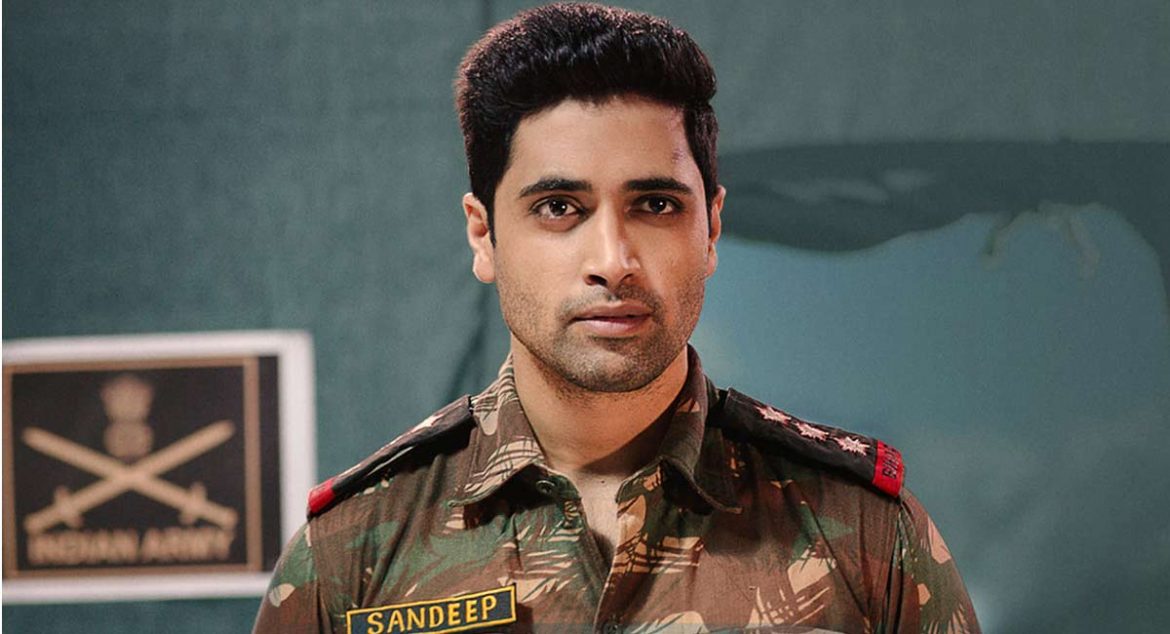The Way Of The Soldier:
The 26/11 terror attacks in Mumbai (2008), are indelibly inked in the city’s memories. Among the people who showed extraordinary courage, a few stand out, and the list has Major Sandeep Unnikrishnan in a prominent position. He is the one who led the National Security Guard into the Taj Mahal Palace Hotel to tackle well-prepared terrorists and saved a whole bunch of hostages at the cost of his own life.
A problem with making films about real-life heroes, is that they may not have led very interesting lives; but if the mythologizing is to work, then a large dollop of fiction has to be added to it, or at least a great deal of embellishment. However, heroes are not all born that way, circumstances make them shed their ordinariness and perform superhuman feats, digging into reserves of valour they may not even be aware of—that’s what makes their stories great.
Major, produced by star Mahesh Babu in Hindi and Telugu, directed by Sashi Kiran Tikka and written by his leading man, Adivi Sesh (Hindi dialogue by Akshat Ajay Sharma), actually takes off well into its running time, when Sandeep Unnikrishnan, insists on going to Mumbai with his team, when, as training officer he was not expected to.
Before that, there are scenes of his happy childhood, with his parents (Revathi-Prakash Raj) and sister; and his fascination for the uniform, because his father took him to watch the Navy Parade. Later, in college he falls in love with rich girl Isha (Saiee Manjrekar), goes against the wishes of his parents to join the army, followed by the usual training scenes, at which he excels. Some conflict is induced when a jealous fellow cadet tries to trip up his romance, but that is quickly resolved. These are place-holding sequences to pad the script, but give no real insight into the man’s personality. For instance, his bio on the internet states that his father worked at ISRO, he was in the college choir and was fond of films—these are minor points, but some more research might have shaded the portrait of the soldier with more colours.
Once the action shifts to the terror attacks in Mumbai, the attention moves from him, to the carnage at various spots in the city and focuses on the Taj, where a group of terrorists start shooting the guests. Then Major Unnikrishnan goes in with the 51 Special Action Group, to flush out the terrorists and extract trapped guests.
The set of the Taj is grand (production design by Kolla Avinash), and the action sequences well choreographed (Naba) and shot (Vamsi Patchipulusu), but again, there are needless distractions like the businesswoman (Sobhita Dhulipala) protecting a little foreign girl. Perhaps a little time could have been spared for the hotel employees who went beyond the call of duty to help guests.
There are scenes of a ravenous media foolishly providing intel to the terrorists, which has been analysed and criticized already. There is hardly any interaction between the Major and his men, though the commanding officer (Murali Sharma) gets some footage. The way the sequences are handled, the small band of terrorists seem indestructible—they are shot at, gassed, bashed and keep coming right back.
There were more unpredictable action set pieces needed, like the one at the hotel pool, because there is not much visual variety in guns blasting and grenades going off. Major Unnikrishnan not only saves his comrades, but also several terrified guests, before succumbing to his injuries. Of course, the right emotional and patriotic buttons are pushed (accompanied by Sricharan Pakala’s loud background score); who would not sympathise with Isha, feeling neglected and lonely; or the anguished parents who get the news of their son’s death from the TV. Their grief gives the film its lump-in-the throat moments. Adivi Sesh looks the part and plays the soldier with sincerity and the older actors as his parents imbue their scenes with warmth.
Films that remind audiences of the tough tests thrown at a city and its people to test their resilience, are required from time to time, and the right heroes placed on pedestals (as opposed to gangsters and other low-lifes). It would help the cause if these films were not so formulaic; if an attempt were also made to better understand the psyche of those who risk their lives for others, instead of getting by with sloganeering short-cuts. The audience applauds in the end, if not for the film’s strengths, then for those heroes, who, for a while, made them feel invincible and proud by proxy.
(This piece first appeared in scroll.in)

